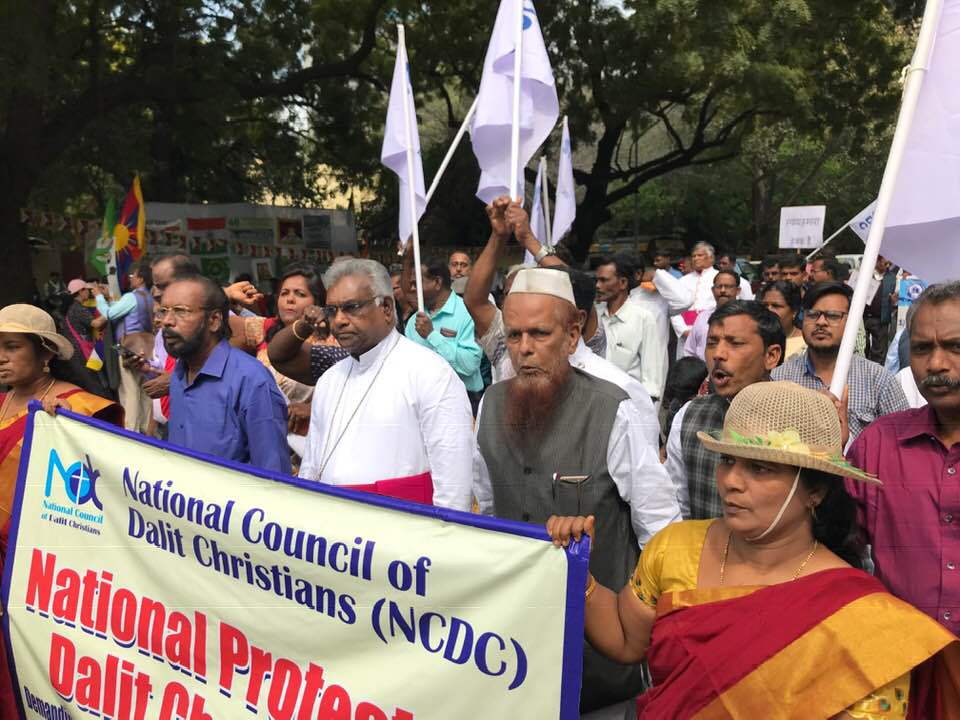
Bishop Neethinathan Anthonisamy leads a rally in New Delhi, India, calling for recognition and rights for Dalit Christians and Dalit Muslims. (Courtesy of Sujata Jena)
The Easter Vigil Exsultet begins with the words, "Exult, let them exult, the hosts of heaven, exult, let Angel ministers of God exult, let the trumpet of salvation sound aloud our mighty King's triumph!"
It continues, "This is the night when once you led our forebears, Israel's children, from slavery in Egypt and made them pass dry-shod through the Red Sea. This is the night that even now, throughout the world, sets Christian believers apart from worldly vices and the gloom of sin, leading them to grace and joining them to his holy ones."
The Exsultet at the Easter Vigil is beloved by many. It's a lengthy proclamation sung before the paschal candle, traditionally by a deacon, during the Easter Vigil in the Roman Rite of Mass. In India, particularly in my native region of Odisha, the melody and lyrics of the Easter Exsultet in the Odia language are spiritually uplifting. The Exsultet is kept alive with such enthusiasm and devotion, with a young priest chosen particularly to lead the chant. It is a deeply moving experience for both the priest and the faithful congregation.
The Exsultet has captivated me since childhood. I would eagerly join the faithful, fully engaged in singing, despite my not-so-soothing voice, paying close attention to every word of the lyrics and the dynamics of the phrases. The Exsultet moves me profoundly, recreating spiritual inclinations, emotion, and conviction of hope, love, faith and transcendence. Indeed, it is a song of liberation.
The first message we receive about the biblical God is, "I have heard the cry of my people!' (Exodus 3:7). Moses was called by God, entrusting him with his vocation to liberate the Israelites. Yahweh, upon hearing the cry of the enslaved Israelites, initiated their liberation, leading to the formation of the covenantal people of God with their own nation. In the prophetic tradition, Yahweh taught us to listen to his own voice through the marginalized, exemplified by Jesus of Nazareth.
The same God continuously invites us today to hear the cry of the poor in our context. In India, the poor encompass Dalits, Indigenous communities, women, children, and social and religious minorities. For my reflection, I wish to focus on a particular group, the Dalits, especially Dalit Christians.
The term "Dalit" comes from the Sanskrit "dal." It means burst, split, broken or torn asunder, downtrodden, scattered, crushed and destroyed. In popular parlance, “Dalit” refers to the "untouchable" population of India in the caste-ridden hierarchical system. So, the term Dalit has been used to identify those communities that have been economically, socially, and politically oppressed for centuries by the hegemony of the Brahminical Hindu social order, that is, the caste system.
Advertisement
I had the privilege of attending a national conference, "Synodal Church: Voice of the Marginalized in India" Feb. 16-17. During the seminar, I presented a paper titled "Encountering Resistance to Dalit Empowerment: A Dalit Christian Feminine Perspective."
The participants comprised Dalit Catholics and intellectuals from across India, with the attendance of notable church authorities like Cardinal Anthony Poola; Bishop Sarat Chandra Nayak of Berhampur; and his predecessor, Bishop Neethinathan Anthonisamy of Chengalpattu.
In his keynote address, Poola, the first Dalit cardinal, highlighted the absence of any mention of Dalits in the diocesan synthesis of the Synod of Synodality in India. Only after Neethinathan, the former chairperson of the Catholic Bishops' Conference of India office for Scheduled Castes/Backward Classes, raised the issue in the bishops' plenary, was the word "Dalit" added in the document's final version.
The church is a symbol of a patriarchal institution across the world. In the context of India, it is both patriarchal and feudal. The decision-making bodies are upper caste, whether bishops, priests, mothers superior or whoever. Despite the spiritual principle of equality before God, significant inequality persists within the church, with minimal efforts to address or rectify this disparity.
Who are the Dalit Christians? According to the CBCI Office for Scheduled Castes and Backward Classes, Dalit Christians constitute a significant majority, making up about 64% of Catholics in India. This amounts to 16 million individuals out of the total 27 million Christians in the country, a population larger than that of some countries and certain cultural Catholic Rite churches.
The CBCI's policy of Dalit empowerment states that Christians of a scheduled caste (Dalits) suffer double discrimination from the state due to the 1950 presidential order, which prevents them from the benefits the constitution of India guarantees their counterparts in other religions. Like their Hindu and Sikh brothers and sisters, they suffer socioeconomic and educational discrimination. But the constitution's article 341 prevents Dalit Christians from having a scheduled caste status.
According to Dalit Religious and Priests, a national social media group consisting of over 160 Dalit rights activists and intellectuals, Dalit Christians face severe marginalization in terms of vocations as priests and nuns, as well as in being appointed to hierarchical positions such as archbishops, bishops, provincials and superiors.
In Tamil Nadu, a southern state of India, Dalit Christians still face segregation in churches, having to attend separate festivals, and occupy designated areas within the church, during funeral processes and in cemeteries. Additionally, in some villages, they are prohibited from walking on the main streets leading to the church.
The Catholic News Agency reports that the Catholic Church in India "runs more than 14,000 schools, 720 colleges, seven universities, five medical colleges, and 450 technical and vocational training institutions." In the absence of data, some human rights activists estimate that about 90% of students in these schools come from Hindu and elitist backgrounds. Confronted about the lack of Dalit children in Catholic schools, a local Catholic priest responded, "What if the child is a thief?" Comments like these reflect the mindset of some individuals within the church community.
It is said that the Dalit Empowerment Policy, approved by CBCI in 2016, has been launched in principle in eight states. However, the implementation remains subject to the individual diocese.
Do we genuinely listen to the cries of our people? Are our large church gatherings simply a spectacle? Is our worship disconnected from the harsh realities of life? Do we show sensitivity toward Dalits, the historically marginalized, oppressed, enslaved and discriminated people in India?
During the national conference on the marginalized in India, attention was drawn to the persistence of caste discrimination in the church, despite it being blatantly against Jesus Christ and the Christian principles of brotherhood, sisterhood and equality. Empowering the church to create an egalitarian society, as envisioned by Jesus of Nazareth, involves listening to the ethical sensitivities of the wounded psyche and battered consciousness of the Dalits.
As Christ's disciples, we must make it our mission to eliminate the sins of casteism and untouchability and embracing Dalits as our mission priority aligns with the Gospel mandate found in the Nazareth manifesto of Jesus. By actively listening to their cries, we reflect our commitment to the eucharistic culture of serving the least with genuine communion.
I believe the true spirit of singing the Easter Exsultet in Indian churches is found in achieving equality and liberation for Dalits, the Indigenous and minorities. The Exsultet will be meaningful only when we recognize the presence of God in the liberation of marginalized communities. Let's pray for this total liberation.





